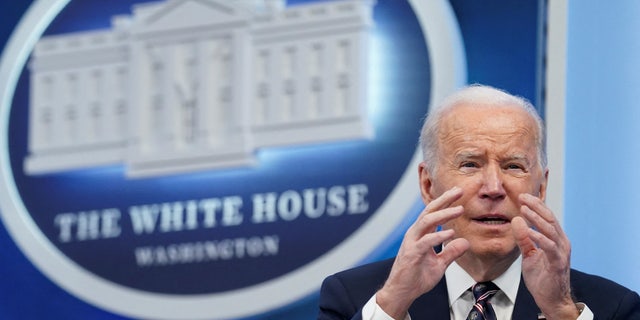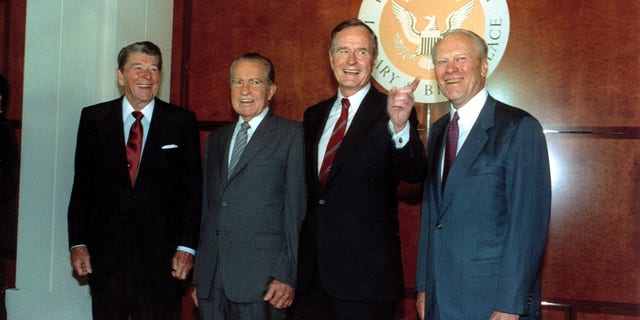Biden’s White House is battling over the border – here’s what history tells us could happen next
NEW York can now listen to Fox News articles!
The New York Times recently provided a rare exposure to internal infighting in the Biden administration. According the Times, internal disagreements on border security policy, and particularly whether to keep the Trump administration’s “remain in Mexico” approach, have exposed serious fault lines inside the administration between those who worry about the political consequences of the border crisis, and those who want to reject everything the previous administration did on immigration.
While there is always infighting in every presidential administration, this window into the Biden infighting is interesting because there has generally less news about tussles inside the Biden administration.
This is so in part because this administration has less drama than its predecessor, in part because the media is looking for it less, and in part because, according to Jonathan Allen and Amie Parnes’ book “Lucky”, Biden himself dislikes process stories, by which he means stories about internal disagreements.

FILE – U.S. President Joe Biden hosts a virtual roundtable on securing critical minerals at the White House in Washington, U.S., February 22, 2022. REUTERS/Kevin Lamarque
Internal fights are really not supposed to happen, as people inside an administration are putatively on the same team. Yet when serious policy differences emerge, the nastiness can really follow. We have seen this before in the White House, as internal debates can set sharp elbows flying, at times with long-standing implications.
In the Truman administration, Secretary of State George Marshall – along with the rest of the foreign policy establishment– opposed the recognition of the State of Israel. In this, he was opposed by White House aide Clark Clifford, who was tasked by Truman with making the case that the U.S. should recognize Israel.
After a bitter debate in front of the president, Clifford won the day, but he also gained an enemy. Marshall never again spoke to Clifford, or even said Clifford’s name, for the rest of his life.
Clifford would serve in a more senior role in Lyndon Johnson’s administration, this time as Secretary of Defense. Unlike Truman, who encouraged debate, Johnson’s efforts to stifle disagreement within his administration on Vietnam led to the alienation of his friendship with Clifford. Johnson’s suppression of dissent led some fearful aides to create a secret group, “the non-group,” that met to discuss Vietnam concerns without Johnson knowing.
CLICK HERE TO GET THE OPINION NEWSLETTER
Republicans are not immune to these tendencies. In the Nixon administration, National Security Adviser Henry Kissinger sought to keep Secretary of State William Rogers out of the loop on the administration’s outreach to China.

FILE – Former U.S. presidents Ronald Reagan, left, Richard Nixon, and Gerarld Ford, far right, pose with U.S. President George Bush, second from right, in the Richard Nixon Library and Birthplace in Yorba Linda, Ca., July 19, 1990. (AP Photo/Barry Thumma)
In this effort, Kissinger went so far as to keep Rogers out of the historic meeting between Nixon and Chinese leader Chairman Mao Zedong, a serious breach of protocol. Even Kissinger recognized that this was a step too far, writing later that “The neglect was technically unassailable but fundamentally unworthy.”
In the George W. Bush administration, infighting among various factions over America’s Iraq policy led to the single nastiest thing done between rivals in an administration. The Justice Department launched an investigation into who had leaked the name of Valerie Plame, a CIA operative whose husband had written an op-ed critical of the administration.

FILE – In this April 29, 2006 file photo, Ambassador Joe Wilson and Valerie Plame leave an after party for The White House Correspondents’ Dinner at the Macedonian Embassy in Washington on Saturday, April 29, 2006. Wilson, the diplomat who disputed pre-war intelligence on Iraq and endured retribution, has died. He was 69. Plame confirmed in a text message that Wilson died Friday, Sept. 27. 2019, of organ failure in Santa Fe, N.M. She called him a patriot with the heart of a lion. Wilson’s denial of pre-war intelligence under the administration of President George W. Bush touched off retribution against Plame and a criminal cover-up. (AP Photo/Kevin Wolf, File)
Deputy Secretary of State Richard Armitage had leaked the name, but he and his boss Colin Powell stayed silent as the investigation proceeded for fear of that this information might embarrass State in its struggles with the Pentagon and Vice President Dick Cheney’s office. The investigation eventually ensnared Cheney aide Lewis “Scooter” Libby, who was convicted of lying to the FBI, even though Armitage had been the one to leak Plame’s name.
CLICK HERE TO GET THE FOX NEWS APP
Of course, there are many reasons for internal fighting in administrations, among them petty concerns over position, title, and even press coverage. But the most consequential – and the nastiest — fights are over serious policy differences that can change the direction of the country and potentially history.
The Biden infighting over border issues alerts us to a significant dispute over our nation’s border enforcement policy, and the anger on both sides of this divide reflects disagreement not only within the administration but also within the Democratic Party, and the nation.


